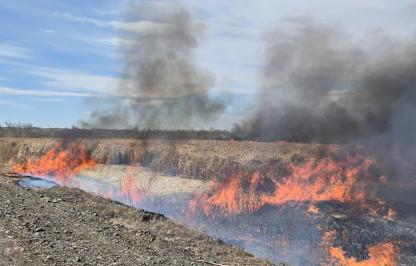Since the early 2000s, the Wyoming Game and Fish Department has engaged in efforts to conserve and restore Flannelmouth and Bluehead suckers in their native drainages. These efforts are aligned with their responsibility to conserve and enhance “all aquatic wildlife and their habitats for future generations.” The Green River fisheries management crew, with help from personnel from across the state, is taking steps over the next two weeks to eliminate threats to the future persistence of Flannelmouth and Bluehead suckers inhabiting the Big Sandy River upstream of Big Sandy Reservoir.
The plan entails chemically treating the river and reservoir with rotenone to eradicate nonnative species. The river is the primary habitat for the two native suckers which can hybridize with introduced white suckers and longnose suckers. The reservoir is being treated to eliminate a large source of nonnative fish, especially the illegally introduced burbot. White suckers and burbot are significantly reducing the fisheries potential in the reservoir: white suckers bind up the majority of resources in the reservoir and burbot consume trout. The sport fishery in the reservoir will benefit from their removal.
Rotenone is a naturally occurring chemical found in the seeds and stems of several plants. It is lethal to fish and other gilled life at very low concentrations but is not a concern for wildlife, livestock, humans, or pets. It has been used by government agencies to kill fish in rivers and lakes in the United States since 1952.
The Wyoming Game and Fish Department has spent the previous two and half months salvaging native suckers from 56 miles of the Big Sandy River upstream of the reservoir. These fish are being held for safekeeping at two facilities. Once all nonnative fish are removed from the river and reservoir, the native fish will be repatriated to the river.
John Walrath, Fisheries Biologist for the Green River Region, understands why some people question the Department’s decision to spend time and money on Wyoming’s native nongame suckers and chubs, but cites the call for federal protection of wildlife species as the reason.
"Populations of flannelmouth and bluehead suckers have declined in Arizona, Colorado, Nevada, New Mexico, Utah and Wyoming," Walrath said. "The six states have developed a range-wide conservation agreement and strategy with the goal of ensuring the persistence of bluehead sucker and flannelmouth sucker populations throughout their ranges. We believe that, as fisheries managers, we must stay proactive in the management of these two species to keep them from being petitioned for listing under the Federal Endangered Species Act. We do not want these native fish to become endangered, let alone go extinct."
Native fish restoration project underway on Big Sandy
307-875-3223




